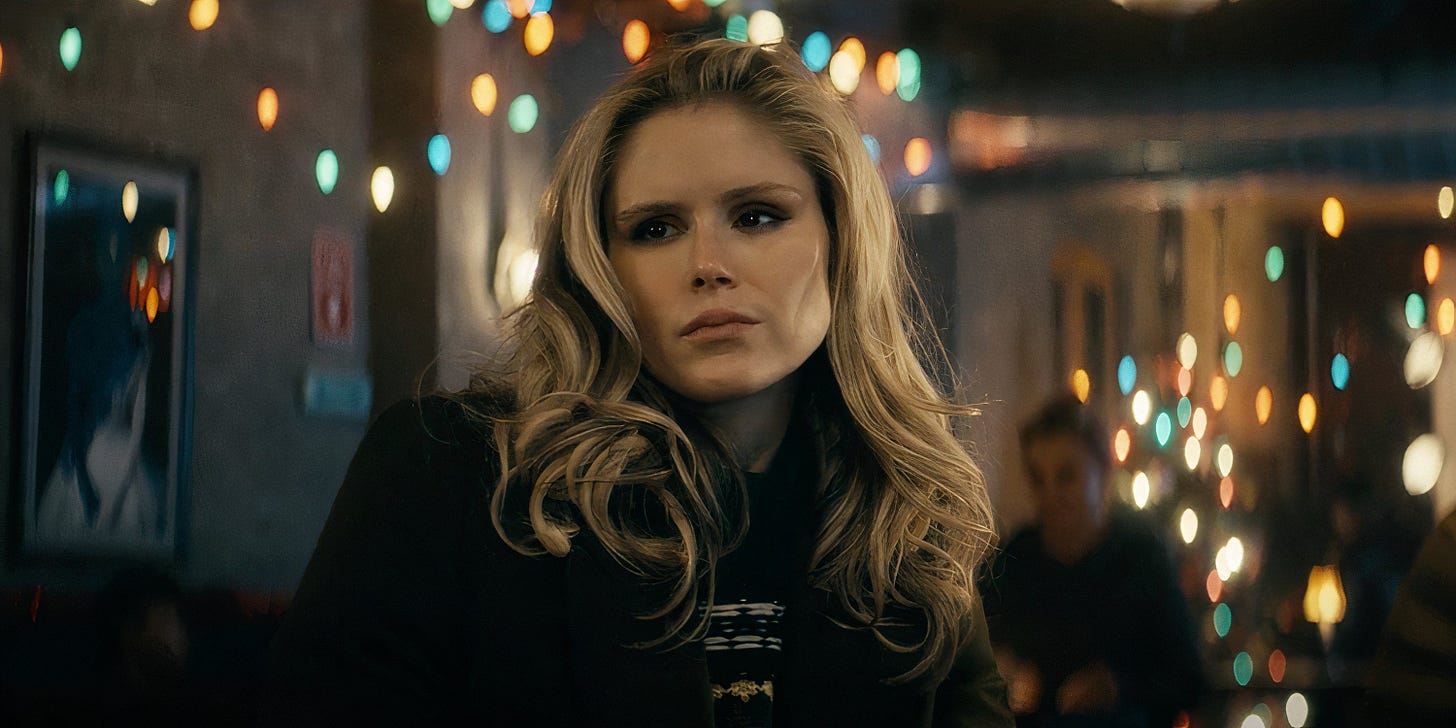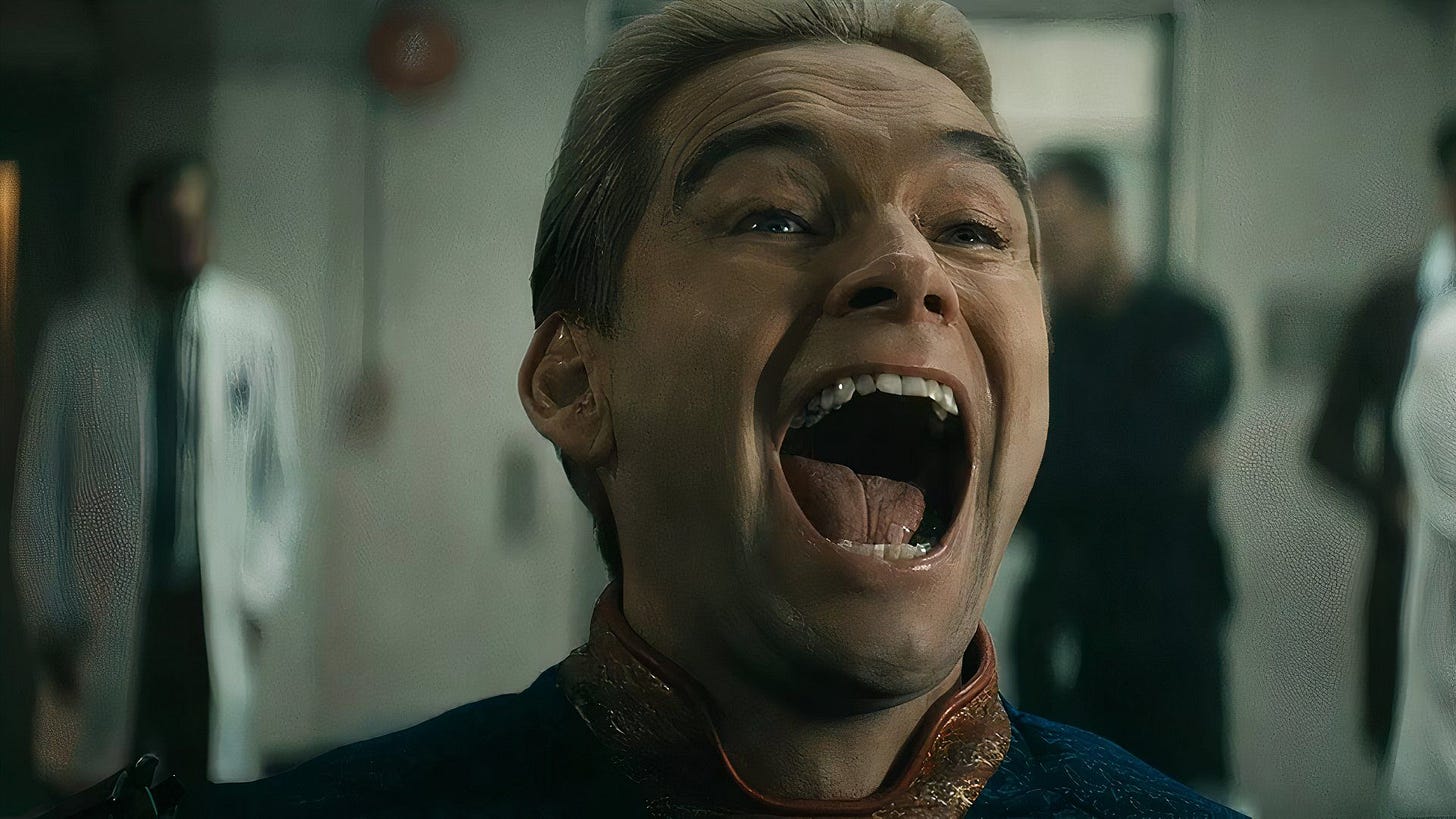The fourth season of The Boys concluded on July 18th. You can find the series on Amazon Prime. This review will discuss both the season finale and the season as a whole.
Please consider this your spoiler warning.
Thanks for reading Off-Balance!
Cheers,
Ryan.
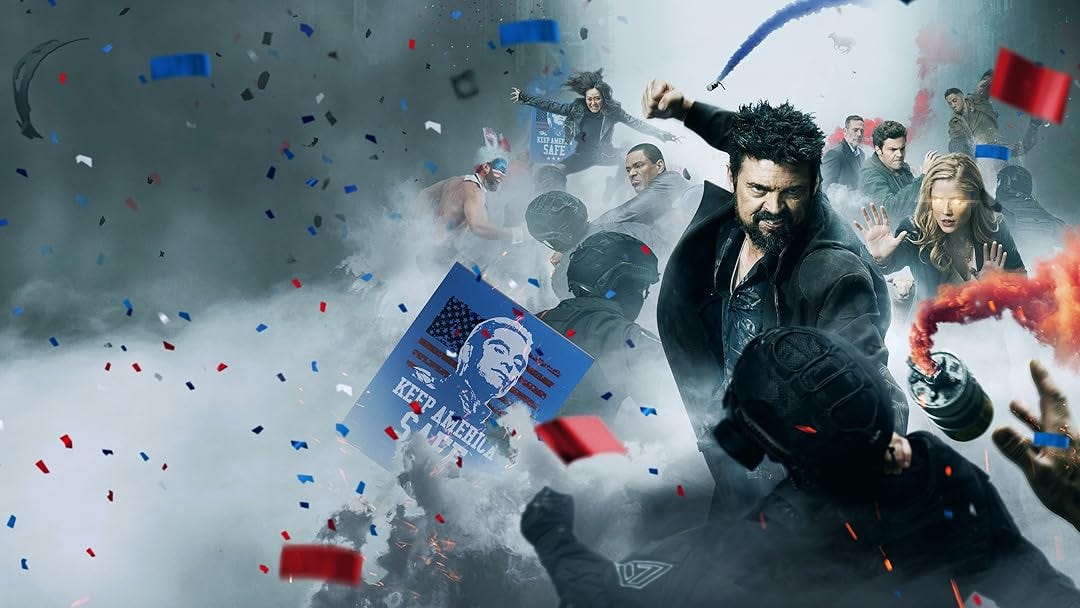
At a glance, you wouldn’t necessarily expect The Boys to have seen the success that it has.
On the surface, it is just another superhero outing in a period of over saturation for the genre, while the same-named comic run it is based on (co-created by Garth Ennis and Darick Robertson) took a decidedly nihilistic approach to its satirizing of then present-day America.
But The Boys, beginning with its first season in 2019, quickly and decisively established itself as one of the most unique shows on television.
Only loosing adapting its source material, it was a rare mix of genre parody, genuine character work, satirical storytelling acumen and boundary-pushing, if darkly-comedic, wildly unsubtle violence (on various fronts).
The hook alone remains impressive: in a world overrun with corrupt superheroes (“Supes”), only The Boys, a team of CIA-backed, black-ops vigilantes can stop them.
But with its fourth season, which concluded this past Thursday?
Despite some impressive narrative and character work (particularly in the finale) and as-always committed performances, much of the season, by design, felt trapped in something of holding pattern: poorly paced, inconsistently structured and visibly biding time as the show moved the necessary pieces into place in advance of the as-announced fifth and final season.
Effective in doing so?
Come the final hour, absolutely - if not without a few undeniable missteps along the way.
Even after a disclaimer meant to distance itself from recent, real-life political events (while also changing the episode title from the listed “Assassination Run” to the far more generic "Season Four Finale"), The Boys doesn’t waste any time getting down to business.
The votes have been counted and Congress is certifying the results as a new political age for America looms: a puppet democracy, a shadow dictatorship, ruled by Homelander (Anthony Starr), in all his faux-freedom, milk-loving mania.
When to-be Vice President Neuman (Claudia Doumit) is outed as a Supe on live TV however, she (finally) realizes she’ll be little more than Homelander’s pawn, even if Singer (Jim Beaver) is, per their plan, assassinated and she ascends to top job. So looking to protect both herself and her daughter, Zoe (Olivia Morandin) she calls Hughie (Jack Quaid), looking for a way out.
But try as they might? Hughie and the rest of The Boys already have quite a few irons in the fire.
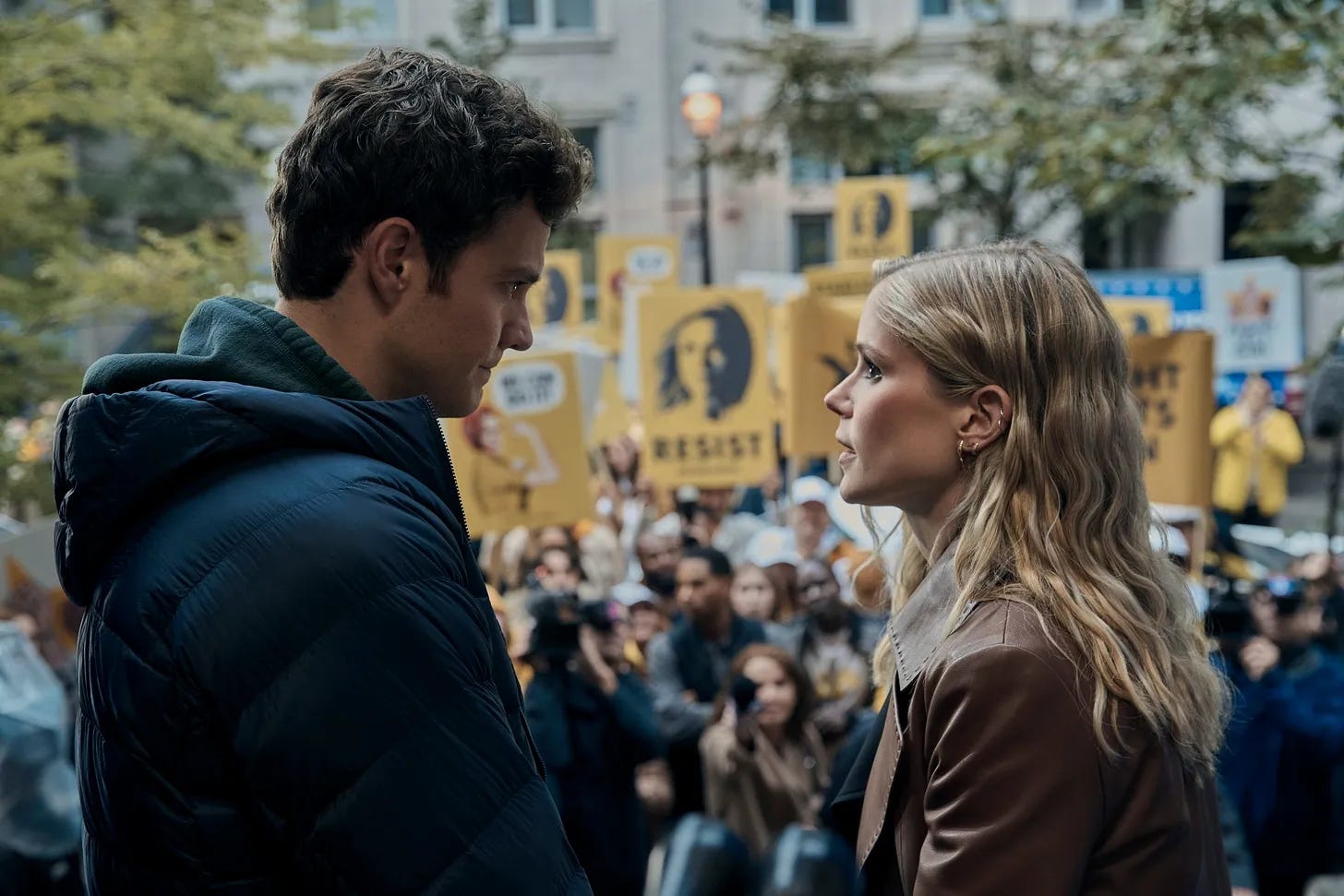
Frenchie (Tomer Capone), for one, has been working overtime to perfect that Supe-killing virus, as MM (Laz Alonso), seemingly more settled into his reluctant-leadership role, tries to keep him on track - but Frenchie is having none of it.
It is ready when its ready, potential end of the world be dammed.
Considering his story for most of the season has had him both physically and emotionally separated from the rest of the team?
Having him back in his element, if only briefly given everything else going on, is a plus, as alongside Kimiko (Karen Fukuhara) they have both reconciled with their pasts and fortunately, each other.
Admitting (and acting on) the romantic feelings they’ve quietly shared since the very beginning of the series (with Fukuhara, as always, doing so much purely with her physical acting, in portraying a character who doesn’t speak).
There is little time to celebrate though.
The group is firmly up against the wall, even before Hughie realizes that all his “break glass in case of emergency” leverage on Neuman has disappeared.
The culprit? The unnamed, shape-shifting Supe who Hughie, to his horror, realizes has been impersonating Annie (Erin Moriarty) since the end of the previous episode (said to be ten days, which included a marriage proposal).
But right before the shape-shifter can ice Singer, the real Annie, having been in captivity and put throughly through the wringer, arrives in the nick of time and chokes out her dark-side doppelgänger… though only after being forced to reconcile with the internal back-and-forth that has defined her arc this season.
For most of her life, Annie January has presented and believes herself to be, unlike virtually all of her Supe contemporaries, a genuine hero, driven to do the right thing.
Her doppelgänger, however, who has absorbed her memories, gives a different perspective: suggesting Annie has always placed blame on everyone else, instead of truly taking responsibility, content to comfortably hide behind her veneer - even as she struggles with her self-worth and confidence.
Maybe, Annie says, she isn’t a hero after all… but she’ll do anything to protect those she cares for, “Starlight” or not.
Overall, it is series-best work from Moriarty, who plays both the shape-shifter’s devious, there-could-be-some-truth-to-it sociopathy to a tee, while also nailing a conflicted, burnt-out Annie, in the same scene, fantastically well (and it all provides some great pay-off come the episode’s end when Annie, suggested to have found her inner balance, is under control of her powers once more).
But not everything is resolved quite so neatly.
After all mate, this is The Boys.
As he lay dying in an off-the-books government facility, Butcher (Karl Urban) seems determined not to give into his worst impulses, even at the cost of his life - those impulses being, in this case, the V-boosted parasite (played by Jeffery Dean Morgan) which has spent the past few weeks eating his brain from the inside out.
Visited by Grace (Laila Robins) and Ryan (Cameron Crovetti), Butcher tries to find some modicum of peace, calling Hughie in what is set-up as a genuinely touching goodbye, as delivered by Urban.
Butcher, apologizing for all the damage he has inflicted in his take-no-prisoners crusade.
This extends to Ryan: reminding him of the promise he (Butcher) made to Becca (Shantel VanSanten) as she died, that he would keep Ryan safe. But if Ryan feels he is safest with Homelander? Butcher won’t stand in his way.
Grace though, disagrees.
She tells Ryan he is the only one who can stop his father, especially now, as he inches ever closer to the White House, while also revealing a handful of the atrocities Homelander has committed (including the rape of Becca, which led to Ryan’s conception).
In the moment, frankly, such bluntness feels pretty out of character for Grace (who, for the record, was vastly under-utilized throughout the season) but sometimes you just need to move the story from point-A to-B.
And for better or worse? That is exactly what happens.
Ryan, upon deducing that his “Aunt” Grace intends to keep him more-or-less prisoner in the hopes of having the CIA train him as a weapon, lashes out… and promptly kills her.
Having already walked away from Homelander earlier in the episode, it leaves Ryan completely unattached but also, once all the chips are down, throughly underwhelming.
Again.
It isn’t on Crovetti, who does well with what he is given but there isn’t much to say for a character who, since his introduction at the end of the first season, has been switching allegiances faster than Snoop Dogg during the NHL playoffs.
Maybe now though, without any firm attachments going forward, just who he is supposed to be will come into clearer focus.

And speaking of clarity, as he stands, devastated, over Grace’s corpse, Butcher finds his.
He’d been holding out hope that Ryan could be the bridge between Supes and humans but here, at his lowest ebb, he relents, giving into his “Kessler” persona and allowing it to take control.
So when Neuman and Zoe meet with The Boys, trying to determine their next steps? Butcher arrives too.
“No deal” he snarls, over Hughie’s pleas as Butcher’s tumour powers, which have been teased since he eviscerated Ezekiel (Shaun Benson) finally reveal themselves to the audience: Venom-esque tentacles that burst from his chest and immediately, quite viscerally too, tear Neuman in half.
The Boys, stunned, are ordered by Hughie to stand down as Butcher, taking the virus from Frenchie, tells them, even as he betrays his only remaining allies, that they should be grateful.
He’s going to fix everything.
It is, in a way, the dark apex of Butcher’s arc throughout the entire series to this point.
Having always struggled between the positive influences of his long-deceased brother, Becca, Ryan and The Boys (particularly MM and Hughie) and his drive to take down Homelander (and by extension, all other Supes), whatever the cost.
Well now, having throughly buried what was left of his conscious? It seems that cost has been paid, as he unknowingly steps onto equal footing with his sworn-rival.
Supe-Genocide, as Kessler dubs it, is next.
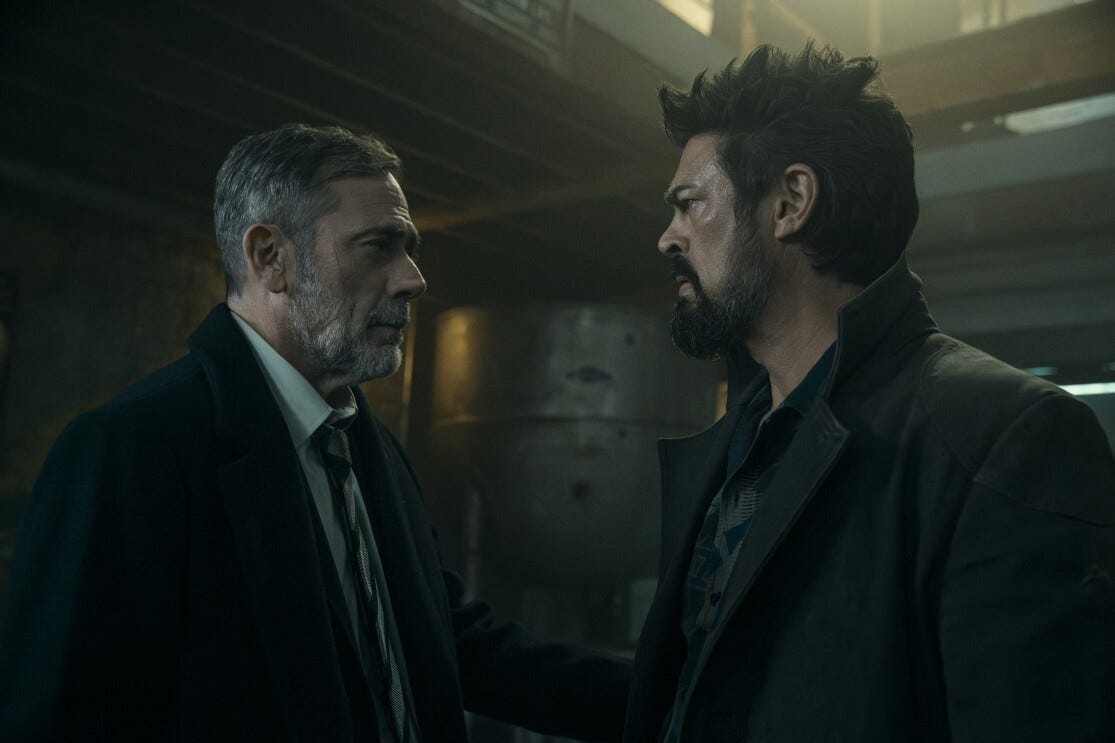
But as Nueman’s death becomes public (killed, the masses are told, by “Deep State Starlighters” on Singer’s orders) it seems that Sage (Susan Heyward) was a few steps ahead after all.
Returning to the Tower, she tells Homelander that, with Singer being arrested, Calhoun (David Andrews) has become President and as his first order of business?
He declares martial law, giving Homelander and his legion of Supes across the country carte blanche to enforce “justice” as they see fit: starting with rounding up The Boys and murdering anyone at Vought who may stand against them (including Colby Minifie’s Ashley, who manages to slip away and dose herself with V to yet-unseen results).
Sage says it was all part of her plan and walking off, encourages Homelander to call her when “Phase Two” begins.
It works well enough.
Sage’s motivations, her expressed hatred of humanity aside, remained purposely ambiguous throughout the season and this, trying to deduce her endgame, is no different.
And while both her and Firecracker (Valorie Curry) were played well, neither had the narrative weight or screen presence to match previous antagonists Stormfront (Aya Cash) or Jensen Ackles’s Solider Boy (who, in a mid-credit scene, Homelander tracks down, finding him still in cryosleep).
The easy money?
Put it on the Gen V characters who have already crossed over and any other wildcards Sage might have up her sleeve - even if it is just “watching the world burn.”
And Homelander?
Buoyed by Anthony Starr’s excellent (if deeply unsettling) performance, he remains an immensely compelling villain, if betrayed somewhat by the revelations that have worked to steadily pull back the layers on Vought’s one-time pride-and-joy.
That alone, a particularly intriguing wrinkle: he has been portrayed as a villain, to the audience, openly, from the very beginning but no longer is he the seemingly buttoned-up man of mystery with an unblemished public record, as presented at the start of the series.
Rather, we’ve seen him for what he is, as he continues to spiral, descending further and further into utter madness: a rapist, a predator, a mass-murderer and a tremendously disturbed individual with a somewhat tenuous grasp on reality.
A seemingly unkillable Supe, who was purposely raised as nothing but a lab experiment at the cost of most of his humanity, driven by crippling narcissism and an unspoken need to be loved by those who ultimately fear him.
And now, with the US Government under his dangerously unbalanced gloved thumb, the world is next.
But with this increased characterization has also come with a few prominent growing pains.
With a season to go, no, The Boys won’t get to take a true shot at Homelander or vice versa - the stakes, naturally, will be at their highest come the end but it also means that the in-the-moment narrative work struggled throughout most of the past eight episodes.
Needing to hold characters back, playing fast and loose with their powers as the situation required, contrivance, more than anything, coming out on top (comic book storytelling at its best, then).
This, speaking to the fourth season of The Boys more than anything else.
Strong creative identity marred by inconsistent execution as the show continually finds itself pushing up against its own boundaries.
For every A-Train (Jessie T. Usher) redemption arc or conversely, fall into complete (semi-comedic) irredeemability by The Deep (Chace Crawford), there is the missed potential of Black Noir II (Nathan Mitchell) or general thematic repetition across the board.
Listen, The Boys has never been all that shy about its political leanings and there is, in fairness, a particular amusement to be found in the American far-right only clueing in now that, yes, the show has been mocking them this entire time (justifiably) but parody alone can only carry so much weight.
Simply grafting real-world political horror stories onto the narrative works on a base level but The Boys doesn’t really have anything new or show-specific to say about these things either.
And sure, it is “just” a comic-book adaption but in hewing so closely to the current moment, The Boys, naturally, opens itself up to such discussion.
In the same way, their dependance on violence has also seemed to have lost some of its lustre, although that goes without saying.
When you make your name trading on “oh shit!” shock value, thirty-plus episodes later, it is going to inevitability lapse into the familiar.
The catch though, is to make that content consistently engaging.
Whether it is Homelander literally tearing someone limb-from-limb, Kimiko, healing herself from fatal injuries or maybe an impromptu-amputation with a hacksaw: on The Boys, hey, these things happen.
But the continued reliance on crude, sex-based humour (much of it inherently serious) and having it played almost exclusively for laughs?
A carryover from the comics though it may be, it is disheartening. Especially when you consider the relative maturity of which The Boys approached Annie’s sexual assault by The Deep during the first season (and all of Becca’s story too).
Did we really need to see Hughie be assaulted by Tek-Knight (Derek Wilson) and Ashley? Or see him have sex, repeatedly, with the shape-shifter posing as Annie, while thinking it was actually her?
These events may push the narrative forward, however clumsily but they don’t add anything to Hughie’s character or enrich it in any meaningful way. There is work done between Hughie and Annie’s dynamic, once everything is revealed, which is appreciated but the more questionable and damaging specifics are basically glossed over, in the bigger picture sense, as the finale wraps.
Another sign the show is probably ending at the right time, with its focus, on the whole, starting to wane.
Speaking to Variety in June, show-runner Eric Kripke confirmed it will be some time before the fifth season arrives, with filming expected to last well into next year (independent of the second season of Gen V) but as “Season Four Finale” goes out with a bang, it is a reminder of the momentum The Boys can generate when it chooses.
Homelander, with the power and respect he has always craved and with The Boys, choosing to separate for their own safety, only to be promptly jumped by his cronies, save for Annie who on Hughie’s urging, flies to safety.
MM and Hughie are captured, Frenchie is brainwashed by Gen V’s Cate (Maddie Phillips) and Kimiko, in anguish, cries out her first words of the series (“No!” - brutal).
Meanwhile?
Driving off into the night, virus in hand, is Butcher, cloaked in darkness - the presentation and framing, not leaving much of anything to be misinterpreted.
A Grim Reaper with nothing to lose.
Good luck stopping him.





